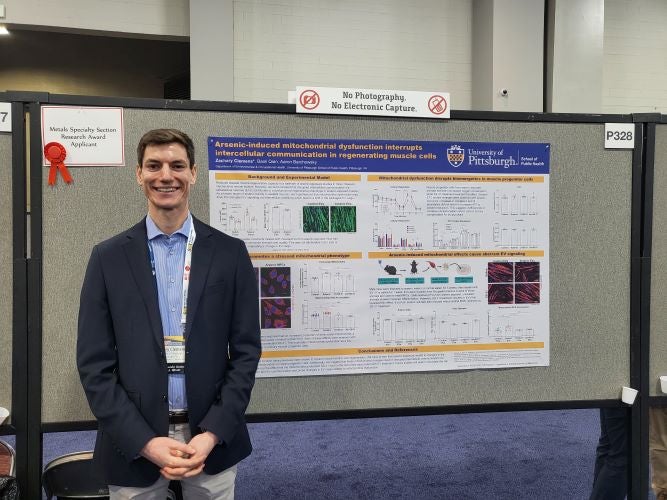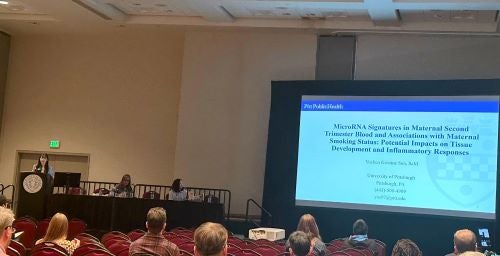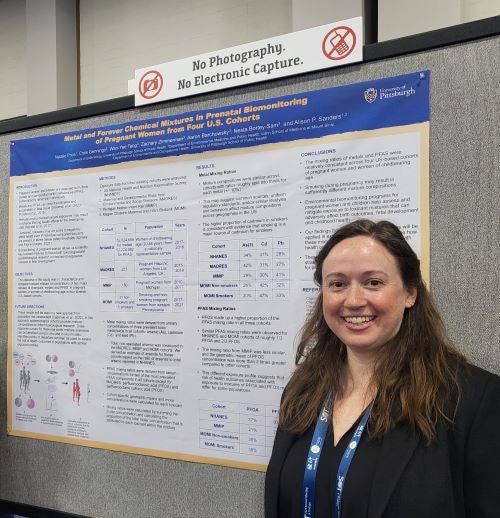EOH students presented at the 63rd Annual Meeting of the Society of Toxicology, held March 10-14, 2024 in Salt Lake City, Utah. Zachary Clemens, Yuchen Kristine Sun and Natalie Price were honored with research and travel awards. Additionally, BSPH students and fellows from Pitt’s faculty with secondary EOH appointments presented their findings at the meeting.
Zachary Clemens was awarded the Metals Specialty Section Research Award for his poster

presentation, “Arsenic-Induced Mitochondrial Dysfunction Interrupts Intercellular Communication in Regenerating Muscle Cells.” Arsenic-related diseases affect the health of hundreds of millions of people globally, and his research addresses questions about how arsenic negatively affects the ability of muscle stem cells to impair skeletal muscle metabolism and regeneration, both of which have been linked to an increased risk of cardiovascular and metabolic diseases, as well as a decline in mobility. Clemens used 2D and 3D in vitro models of muscle regeneration developed with Kai Wang in Fabrisia Ambrosio’s laboratory at EOH to explore the role of arsenic-promoted mitochondrial dysfunction in impaired muscle regeneration, as well as the role of extracellular vesicles (EVs) in communicating this dysfunction. The studies suggest novel strategies to treat arsenic-exposed individuals and reduce their burden of cardiovascular and metabolic diseases. Clemons is a fifth-year PhD student mentored by Aaron Barchowsky.
Yuchen Kristine Sun received the Travel Award presented

by the Society of Toxicology. Sun’s abstract was selected for an oral presentation at an Epigenetics Session. Her talk, entitled “MicroRNA Signatures in Maternal Second Trimester Blood and Associations with Maternal Smoking Status: Potential Impacts on Tissue Development and Inflammatory Responses,” suggests that a set of miRNAs in maternal blood correlates with maternal exposure to tobacco smoke. Assessment of maternal blood epigenetic changes may provide understanding of the tobacco smoke-induced pathophysiologic impacts on mother and infant and serve as a novel tool for early detection of later-life health outcomes among at-risk populations. Sun is a fifth-year PhD student mentored by Winnie Wan-yee Tang.
Natalie Price received an SOT Travel Award to present her poster entitled “Metal and Forever

Chemical Mixtures in Prenatal Biomonitoring of U.S. Pregnant Women.” Natalie, a PhD candidate in the Department of Epidemiology, presented a comparison of toxic metals and per- and polyfluoroalkyl substances (PFAS) measured in urine or blood samples collected from women participating in four U.S.-based studies. Natalie’s study demonstrated that co-exposure to metals and PFAS is common, and she identified mixing ratios of these toxicants that vary by study population and/or study location. This work aims to inform future risk assessment strategies and public health guidelines to account for population- and/or region-specific mixtures. Price’s mentor is Alison P. Sanders.
Rachel Turkington presented a poster summarizing her findings on mechanisms of metal nephrotoxicity. Rachel’s work highlighted the kidney’s vulnerabilities to toxic elements including lead, cadmium, arsenic, and their mixtures. The study has identified key gaps in toxicological findings and next steps for future studies. Rachel is a rising third-year undergraduate in the BSPH program, mentored by Alison P. Sanders.
Annika Spencer shared a poster entitled “Effects of Air Pollution on Health Outcomes of Dialysis Patients.” Her first-authored study was recently published in the journal Current Opinion in Nephrology and Hypertension. Annika is a rising fourth-year undergraduate in the BSPH program mentored by Alison P. Sanders.
Dexi Chen had his abstract selected for a poster presentation, entitled “The Environmental Toxicant Vinyl Chloride Dysregulates the Mitochondrial Response to Stress in Mice.” He demonstrated that despite an observed decrease in mitochondrial respiration caused by vinyl chloride (VC), proteomic analysis indicated that VC exposure actually increased the expression of several proteins associated with Gene Ontology (GO) terms for the electron transport chain. In contrast, the mitochondrial level of key UPR-mediated proteins that protect against mitochondrial damage was decreased. For example, VC strongly decreased mitochondrial levels of GRP78 (also known as BiP), which has been shown to protect mitochondrial function during ER stress. Chen’s mentor is Juliane Beier.